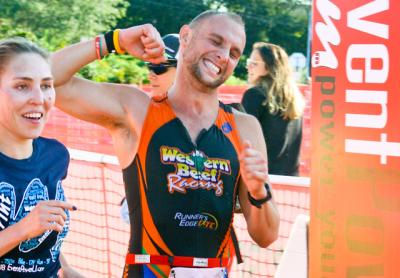Long-Distance Road Races Made for Athletic Weekend

More than 1,500 athletes competed in long-distance road races and triathlons here this past weekend, a good one weather-wise.
Jordan Daniel of Westhampton Beach, Timothy Rossi of New York City, and Thomas Swindell of Baldwin were the winners of the Hamptons Marathon, Half-Marathon, and 5K in Southampton Saturday.
Kira Garry of New York City and Montauk was the women’s winner (and 12th over all) in the half, Audrey Kelly of New York City was the women’s winner (and fifth over all) in the full, and Alychia Buchan of Holmdel, N.J., won among the women (and was fourth over all) in the 5K.
And in Montauk on Sunday, there were 546 finishers in the MightyMan Montauk Sprint, Olympic, and Half-Ironman races, the Half-Ironman’s winner, Matthew Raske, finishing in 4 hours, 23 minutes, and 3 seconds.
Most interesting, however, was the fact that the Sprint’s winner, Jim MacWhinnie, now in his mid-40s, was given little chance of surviving the multiple internal injuries he suffered nine years ago this December after a 330-gallon fuel oil tank he and his father were carrying down basement stairs landed on top of him.
The Water Mill physical trainer, who lives in Southampton, underwent half a dozen major operations at the time, though you’d never know it now. He wasn’t the first over the line that day — Sean Hardick, the eventual runner-up, was — but MacWhinnie, who started in the third wave of the half-mile Fort Pond Bay swim, was declared the winner when the difference in start times was accounted for.
The swims had to be moved from Fort Pond to Fort Pond Bay this year because of the pond’s slightly high parts-per-million blue-algae counts Friday.
Absent the toxic plume, Tim Steiskal, the Olympic distance winner, said he would prefer swimming in the pond “because it’s calm and the water’s warmer.”
Chris Pfund of EventPower, which puts the end-of-the-season triathlons on, was reasonably satisfied with the way they’d played out despite the last-minute changes, which added somewhat to the bike courses.
He and some of the swimmers, including Steiskal and the Olympic race’s women’s winner, Hallie Nicoll, diverged a bit, however, when it came to describing the swim conditions.
“The water was choppy, brutal, but triathlons are supposed to be challenging,” said Steiskal, who also won the Robert J. Aaron memorial Olympic-distance triathlon in Montauk in June. Terry Bisogno, EventPower’s omniscient announcer, said it was Steiskal’s eighth win of the season. “He’s had a monster year,” Bisogno said.
“It all comes down to how much energy you can expend while still holding it together,” the Patchogue Y’s membership director said. “Today, I found the magical combination. I was first out of the water and built up a heck of a lead on the bike. I was not about to lose this race!”
Like Steiskal, Nicoll also was a winner at the Robert J. Aaron triathlon in June. She had begun as a runner, she said in reply to a question, “but I’m a better triathlete than I ever was a runner. . . . The swim was hard for me — you couldn’t see the buoys, but the rest of it was great.”
She’d finished fourth, she said, in her age group (35 to 39) at the world half-Ironman championships in Port Elizabeth, South Africa, not long ago. “The swim there was in the Indian Ocean, but this was worse! At least the water here was warmer.”
Tommy Koehler, a former New York City policeman whose left leg ultimately had to be amputated because of a bullet wound, placed fifth in the Sprint, about a half-minute ahead of Mike Bahel, Body Tech’s owner. MacWhinnie and Koehler, who lives in Hampton Bays, train for endurance events together and also “grapple,” MacWhinnie said, “at Hamptons Jiu Jitsu in Southampton.”
With his graphite running leg, “I’m much faster,” said Koehler, who provides security on Plum Island these days.
There were a number of blind competitors that day also, including Charles Catherine, the French-born director of TriAchilles International, based in New York City. The Sprint’s eighth-place finisher, Catherine has said that arduous triathlon competitions are great confidence boosters for those who have lost their sight, or limbs, or who might be brain-injured or autistic.
The blind athletes, Rebecca Lindenbaum said, swam tethered to their guides, rode with them on tandem bikes, and ran tethered to their guides as well.
“We train twice a week in Central Park,” she said, adding that “anybody can be a guide.”
Dick Traum, who founded the Achilles Track Club in 1983, had been, she said, the first amputee ever to finish a marathon (the New York City Marathon in 1976).
